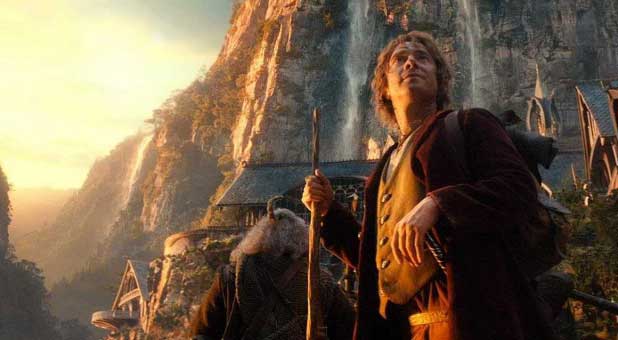“In the hole in the ground, there lived the hobbit.”
The classic opening line in The Hobbit, J.R.R. Tolkien’s 1937 children’s literature classic finally hits the big screen in Peter Jackson’s new film, The Hobbit: An Unexpected Journey, but it’s not necessarily a family-friendly movie and Christian elements are not clearly evident.
Almost a decade after the New Zealand filmmaker concluded his hugely successful Lord of the Rings trilogy—a string of movies that grossed nearly $3 billion worldwide, capped with a best picture Oscar for 2003′s The Return of the King— Jackson has launched yet another three-movie series from the fantasy novelist’s other famous tome.
The Hobbit: The Desolation of Smaug, the second film, is due next December, with the final entry, The Hobbit: There and Back Again, scheduled for July 2014.
J.R.R. Tolkien’s story about “the one ring” doesn’t begin with Frodo Baggins as told in The Lord of the Rings. Before Frodo and Sam, Gandalf and Bilbo, along with a band of 13 dwarves, go on a journey to recover a lost inheritance in The Hobbit.
In the epic prequel set 60 years before The Lord of the Rings, the dwarf kingdom of Erebor has been under the control of the fearsome dragon Smaug for many years. A hobbit named Bilbo Baggins (Martin Freeman) is approached by the wizard Gandalf (reprised by Lord of the Rings veteran Ian McKellen) with an invitation to an adventure.
Answering the call to duty, however begrudgingly, the reluctant hero Bilbo finds himself swept into a quest to reclaim Erebor—joining the company of dwarves led by Thorin Oakenshield (Richard Armitage), the grandson of the last king of Erebor and warrior.
The ordinary dwarves—farmers, carpenters, miners and the like—jointly and separately must battle orcs (goblins), a vaguely humanoid Gollum (Andy Serkis, another Lord of the Rings alumnus), giant spiders, wargs (wolf-like creatures), elves and the dragon Smaug.
With a running time of two hours and 50 minutes, the film, which reportedly had a production budget of $270 million, has been faulted by critic for being too long, tedious and detailed, but you can ignore them because this is a movie for The Hobbit lovers.
The 170 minutes actually passed rather quickly. The story flowed nicely and kept moviegoers’ attention steadily—although several at our screening took bathroom breaks.
The terrain and vistas in The Hobbit are similar to the Lord of the Rings trilogy, but that’s expected since both stories happen in the same place—Middle-earth.
Jackson also made the now-controversial decision to shoot at 48 frames-a-second, which delivers a larger and sharper focus than the usual 24 frames, creating what the director sees as a more vivid audience experience. Translation: It’s pure eye candy. With realism and depth, it’s arguably the deepest 3-D we’ve ever experienced on a movie screen. The Hobbit, which has received generally positive to mixed reviews, exceeds any possible visions you had in your head while reading the book.
The most disappointing part of the film is its latent Christian themes. Sure, in Tolkien’s Middle-earth, there is a right or wrong, goodness and providence. The movie also spotlights the pitfalls of revenge, loyalty, honor, a willing heart and true bravery.
“I hope you never have to [use a sword],” Gandalf tells Bilbo. “But if you do, remember this: True courage is about not knowing when to take a life, but when to spare one.”
The underlying message of the Lord of the Rings trilogy and The Hobbit is the same—“You can do great things, no matter how small you are.”
It’s not well known that Tolkien helped bring his good friend C.S. Lewis, author of the Chronicles of Narnia children’s book series, to Christianity. Unfortunately, the violence in The Hobbit is at least twice as intense than the Chronicles of Narnia movie trilogy, while the Christian themes are sorely lacking.
“The action and special effect of The Hobbit was way better than the Narnia movies,’” observed Andrew, a preteen who attended the movie screening with his two brothers. “But there’s really no God in The Hobbit. In the Narnia movies, it’s clear Aslan is supposed to be Jesus.”
Content Watch: Rated PG-13 for extended sequences of intense fantasy action violence and frightening images, The Hobbit: An Unexpected Journey is not a family-friendly movie when you consider the 300-like violence. Do not bring your small children to this movie. Please. There is no swearing, sex or nudity, but there are elements that should give parents cause to ponder. There is the smoking (whether ceremonial or not) of “pipeweed,” which appears to cause a calming high of sorts. A character is described as crazy because he eats too many forest mushrooms. Ale and wine are consumed with meals. For alums of the Lord of the Rings trilogy, the violence is more of the same. For neophytes, there are some seriously frightening and intense moments. There are battle scenes filled with slashing of swords, dismembering, beheadings, a pile of corpses, implied eating of a slain enemy by wolves and smashing with rocks of non-human character.














































